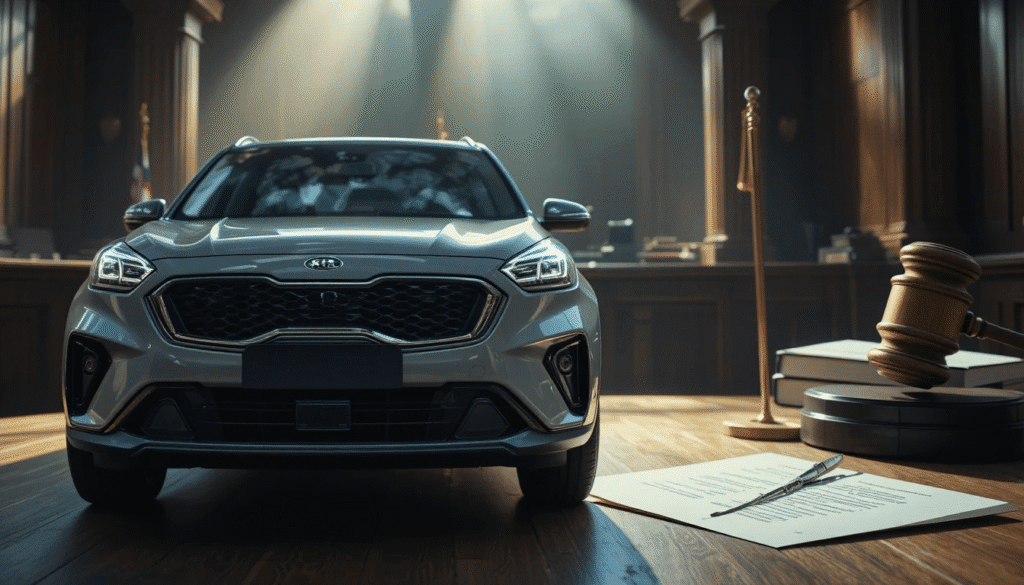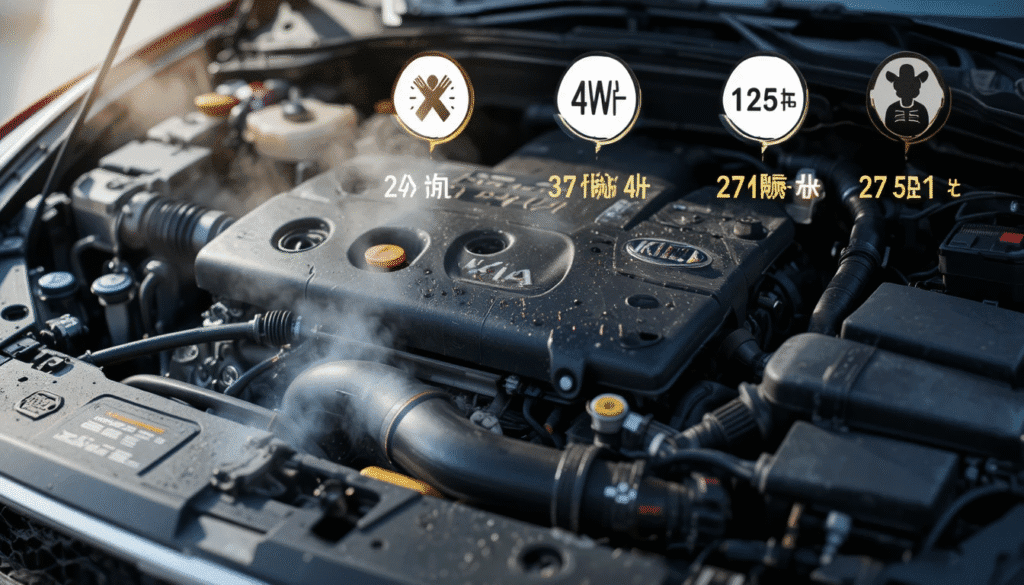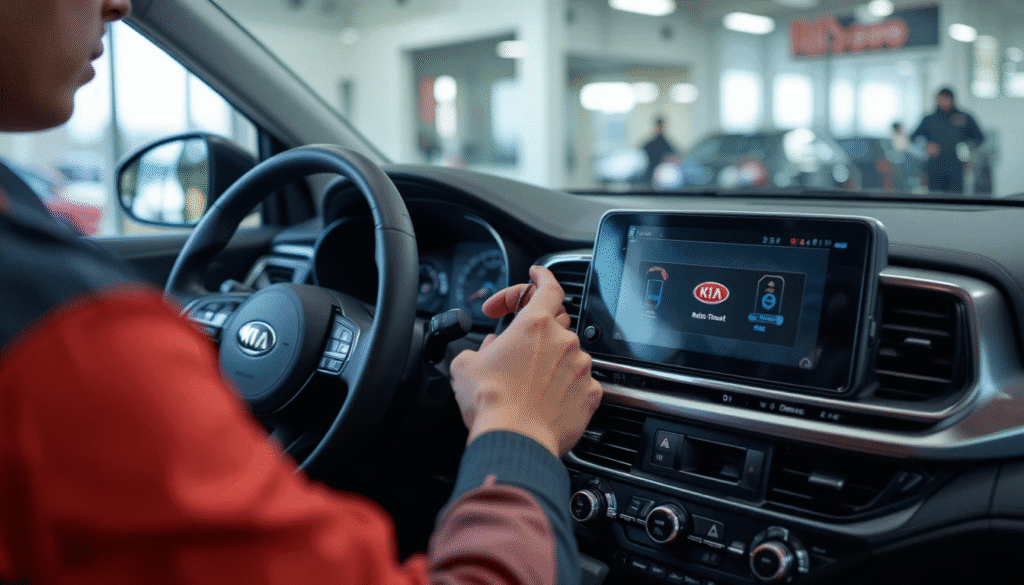Table of Contents
Kia Class Action Lawsuit
Automotive lawsuits often come and go without much public attention, but the Kia class action lawsuits have taken center stage due to the widespread reported issues. From engines catching fire to viral theft challenges exposing serious security loopholes, Kia owners across the United States have faced safety hazards and financial loss.
These problems eventually led to multiple lawsuits, federal investigations, manufacturer recalls, and settlement payouts. Understanding what truly happened, which models are affected, and whether owners qualify for compensation has now become essential for millions of drivers.
| Category | Key Details |
| Core Issues | Engine failures (Theta II engines), vehicle fire risks, and a nationwide theft surge due to the lack of immobilizers in specific Kia models |
| Lawsuit Types | Engine defect lawsuits, theft-related class actions, and reimbursement claims for damages and repair costs |
| Affected Models | 2011–2019 Kia Optima, Soul, Sportage (engine cases) and 2011–2021 Kia models without immobilizers (theft cases) |
| Settlement Benefits | Lifetime engine warranty (for eligible vehicles), repair reimbursements, towing and rental coverage, compensation for fire or theft-related losses |
| Claim Requirements | Proof of ownership, repair invoices, police or insurance reports (for theft/fire claims), recall notification records |
| Current Status | Engine defect settlement approved; theft-related settlements pending in several states with ongoing court reviews. |
| What Owners Should Do | Check eligibility using VIN on Kia’s official settlement portal, gather documentation, and submit claims before deadlines. |
Key Lawsuit Categories Involving Kia

There are two major fronts in the legal battle involving the brand:
- Engine fire risks are linked to defective components or a lack of internal safeguards
- Theft vulnerability lawsuits following nationwide TikTok challenges that demonstrated how easily specific Kia models could be stolen without electronic immobilizers
Each case involves different plaintiffs, timelines, and legal resolutions, but both contributed to large-scale settlements designed to compensate affected drivers.
Engine Defects and Fire Hazard Claims

One of the earliest and most alarming allegations involved unexpected engine failures and fires. Many Kia vehicles equipped with Theta II and related engines experienced sudden stalling, smoke from the hood, or complete combustion while on the road. Owners reported oil leaks, knocking noises, and seizures even when following scheduled maintenance.
Commonly impacted models included:
- Kia Optima (2011–2019)
- Kia Sorento (2012–2020)
- Kia Sportage (2011–2019)
A consumer safety investigation revealed that metal debris inside the engine could restrict oil flow and cause excessive heat buildup. Kia initially issued limited recalls, but increased pressure from owners and federal regulators forced broader action, paving the way for legal compensation.
What the Engine Settlement Offered Owners

Once the lawsuits reached the settlement stage, Kia offered several forms of relief to affected vehicle owners. The compensation package included lifetime engine warranties for eligible cars, reimbursement for past repair costs associated with engine replacements, and coverage for towing and rental expenses incurred during breakdowns.
In cases where a vehicle was damaged or lost due to fire, owners could also receive direct financial compensation. Despite these benefits, many drivers struggled with the application process, citing confusing documentation requirements and unclear eligibility guidelines. Legal advocates advised owners to keep detailed records such as repair invoices, service histories, and recall notices to strengthen their claims and ensure successful approval.
The Rise of the Kia Theft Lawsuit
While engine failures affected mechanical integrity, theft vulnerabilities damaged public trust in Kia’s safety measures. A wave of TikTok videos demonstrated that many Kia models produced between 2011 and 2021 could be started with nothing more than a USB cable due to the absence of immobilizers.
The most commonly stolen models included:
- Kia Forte
- Kia Soul
- Kia Rio
- Kia Sportage (select years)
Major cities such as Milwaukee, Los Angeles, and Atlanta reported theft rates rising over 800 percent in some regions, overwhelming insurance companies and police departments.
Kia’s Response to the Theft Crisis

Initially, Kia issued steering wheel locks through local police departments. Later, a software upgrade was announced to limit ignition attempts without proper key recognition. However, critics argued that technology should have been standard in the first place, as almost all competitors used immobilizers during the same production years.
Settlement Terms for Theft-Related Claims

Kia eventually approved a settlement offering benefits to owners or lessees of affected models. Key coverage areas included:
- Repair reimbursement for stolen vehicle damages
- Payment for insurance deductibles
- Compensation for total loss cases
- Security upgrades, such as anti-theft kits or software patches
The settlement also provided up to $300 for owners who already purchased anti-theft devices before the recall announcement.
Overview of Kia Class Action Lawsuits and Owner Compensation
| Lawsuit Type | Primary Issue | Eligible Kia Models (Examples) | Settlement Benefits |
| Engine Fire Lawsuit | Engine defects, overheating | Optima, Sorento, Sportage | Lifetime warranty, repair reimbursement, towing, and rental coverage |
| Theft Vulnerability | Lack of immobilizer systems | Forte, Soul, Rio, Sportage | Deductible compensation, anti-theft upgrades, and total loss payments |
How to Check Eligibility for Compensation
Owners are advised to contact their dealership or visit the official settlement websites using their VIN. Even second-hand owners may qualify if their vehicle belonged to an affected production range. Legal experts recommend filing sooner rather than later, as many settlements have strict deadlines.
Broader Impact on Kia’s Reputation
Despite the challenges, Kia continues to release new vehicles with improved safety features and stronger reliability ratings. Recent models now include advanced anti-theft systems, over-the-air security updates, and extended warranty options. However, for long-term customers, trust will only be fully restored when previous issues are resolved fairly and transparently.
Final Thoughts
The Kia class action lawsuits serve as a clear reminder that manufacturers must balance affordability with responsible safety engineering. Engine failures and mass theft vulnerabilities were not minor inconveniences — they were life-altering experiences for affected drivers. While settlements have brought relief, many owners argue that proper engineering from the beginning could have prevented years of frustration.
For anyone owning or purchasing a Kia, the most innovative approach is to verify recall history, confirm warranty status, and take advantage of all settlement benefits available. Financial protection starts with awareness — and in this case, knowledge is as valuable as compensation.
Want to know about Drag Racing Charges? Your Legal Defense Starts Here Check out our Law category.
FAQs
Most lawsuits involve 2011–2019 Kia models with Theta II engines (Optima, Soul, Sportage) for engine defects, as well as 2011–2021 Kia models lacking engine immobilizers for theft-related claims.
Owners can verify eligibility by entering their VIN on Kia’s official settlement portal or checking recall notifications received by mail or email.
Depending on the case, eligible owners may receive a lifetime engine warranty, repair reimbursements, towing and rental fee compensation, or theft/fire-related payouts.
In some cases, former owners who incurred repair or loss expenses before selling may still be eligible. Proof of past ownership and repair records is required.
















